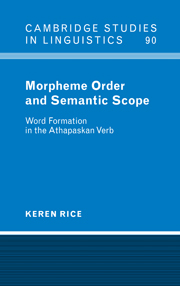Book contents
- Frontmatter
- Contents
- Preface
- 1 Introduction: Beginning the Journey
- PART I FIRST STEPS
- PART II THE LEXICAL ITEMS
- 4 First Stop: Introducing the Lexical Items
- 5 A Brief Side Trip: The Position of the Verb Stem
- 6 Ordering of the Lexical Items
- 7 Voice/Valence
- 8 Summary: Lexical Items
- PART III THE FUNCTIONAL ITEMS
- PART IV A VIEW OF THE LEXICON
- PART V THE END OF THE JOURNEY
- PART VI APPENDIXES
- Notes
- References
- Name Index
- Languages Index
- Subject Index
6 - Ordering of the Lexical Items
Published online by Cambridge University Press: 06 July 2010
- Frontmatter
- Contents
- Preface
- 1 Introduction: Beginning the Journey
- PART I FIRST STEPS
- PART II THE LEXICAL ITEMS
- 4 First Stop: Introducing the Lexical Items
- 5 A Brief Side Trip: The Position of the Verb Stem
- 6 Ordering of the Lexical Items
- 7 Voice/Valence
- 8 Summary: Lexical Items
- PART III THE FUNCTIONAL ITEMS
- PART IV A VIEW OF THE LEXICON
- PART V THE END OF THE JOURNEY
- PART VI APPENDIXES
- Notes
- References
- Name Index
- Languages Index
- Subject Index
Summary
In this chapter I examine the ordering of the lexical items discussed in chapter 4.1 argue that evidence exists, both within individual languages and across the family, for the following generalizations:
(i) Elements in a fixed scopal relationship occur in a fixed order with respect to each other.
(ii) Elements in which the scopal relationship can be reversed occur in variable order, with interpretation related to order.
(iii) Elements that do not enter into a scopal relationship with each other may occur in different orders, both within a particular language and across the family.
As a result, elements that are related by scope have a predictable ordering, whereas ones that do not enter into a scopal relationship must have their ordering stipulated for the particular language.
On the Ordering of the Lexical Items
In the Athapaskan literature, statements are often made to the effect that ordering is relatively fixed within the functional (conjunct) complex across the family, but that when the lexical (disjunct) complex is examined, ordering varies. For instance, Cook 1989:194–195, in a discussion of the numbering of verb prefix positions, states that “pan-Athapaskan prefix order may be established at least for the conjunct prefixes where the differences in prefix categories are primarily in the disjunct prefixes.” Kari 1989:449 makes this point explicitly: “the innermost prefixes [functional – KR] are more directly comparable across the languages than are the outermost prefixes [lexical – KR].”
Information
- Type
- Chapter
- Information
- Morpheme Order and Semantic ScopeWord Formation in the Athapaskan Verb, pp. 79 - 125Publisher: Cambridge University PressPrint publication year: 2000
